Annual Report
Clean water, decent toilets and good hygiene
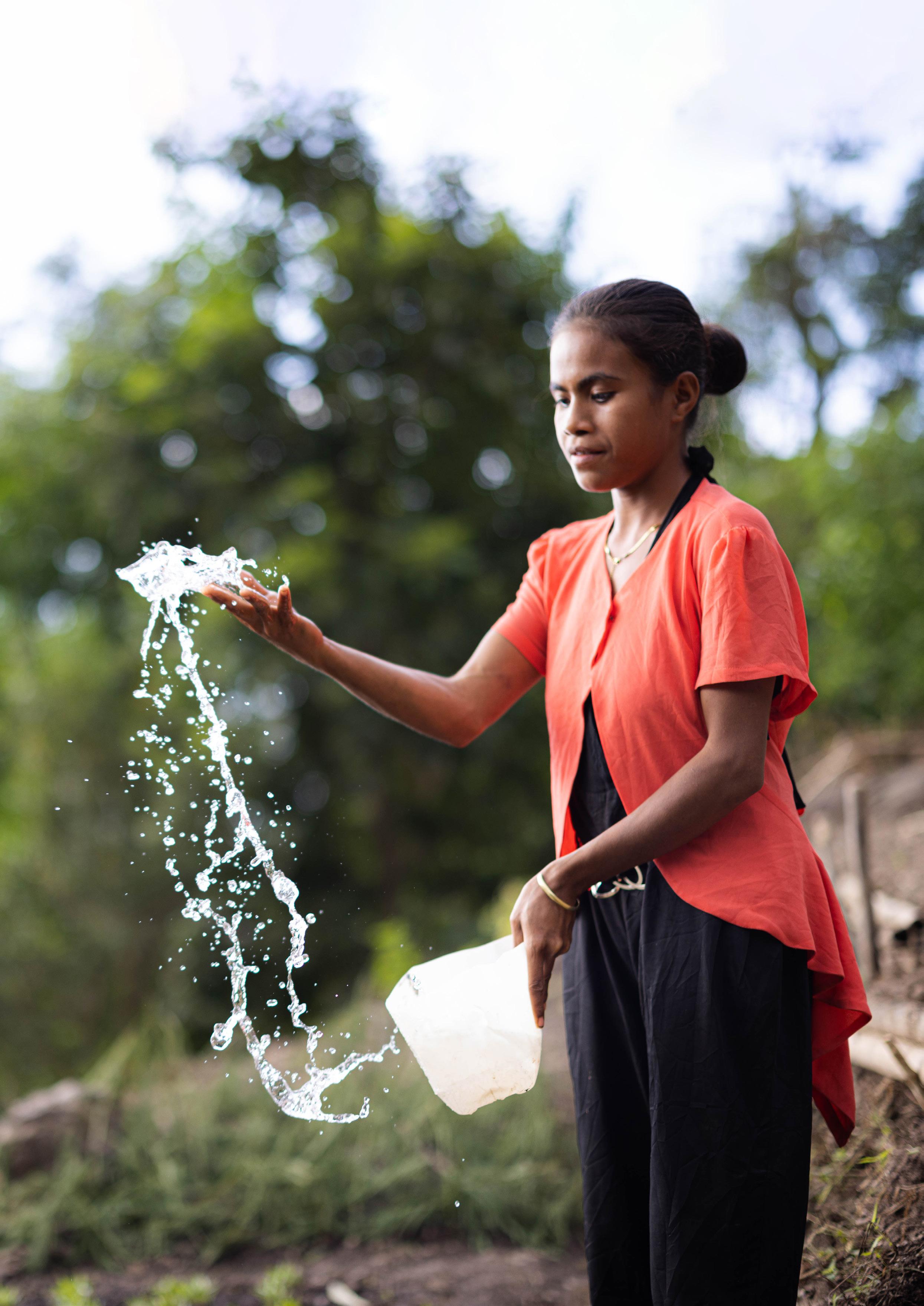
WaterAid/Tariq
Hawari
On the cover: Arminda, 24, waters her vegetable garden with water collected from an open bamboo system in Timor-Leste.

WaterAid is an international not-for-profit, determined to make clean water, decent toilets and good hygiene normal for everyone, everywhere within a generation. Only by tackling these three essentials in ways that last, can people change their lives for good. Learn more about WaterAid at wateraid.org.au
Our vision
WaterAid’s vision is of a world where everyone, everywhere has safe and sustainable water, sanitation and hygiene.
Our mission
WaterAid’s mission is to transform lives through sustainable and safe water, sanitation and hygiene.
Our values
Everything we do is shaped by six values:
• Accountability
• Collaboration
• Courage
• Innovation
• Integrity
• Respect
2 | WaterAid Annual Report 2021/22
WaterAid/Dion Kombeng
WaterAid wishes to acknowledge the Traditional Custodians of the land our Melbourne and Sydney offices are located on, the peoples of the Kulin and Eora Nations. We wish to acknowledge and respect their continuing culture and the contribution they make to the life of these cities and regions.
We value your feedback and address any complaints promptly. If you would like to provide us with feedback or would like to lodge a complaint, please contact us via the details listed on the back page of this report and your message will be directed to the appropriate staff for action and resolution. Our complaints policy is available at wateraid.org.au/complaints
Contents
This Annual Report was written and edited by Caity Hall and the wider WaterAid team. © Copyright WaterAid Australia 2022 From the Chair and Chief Executive 4 Our Strategic Role 5 Our Achievements this year 6 Where we work/our global impact 8 WaterAid’s Global Climate Change Response 10 Water 12 Sanitation 13 Hygiene and COVID-19 14 Our Work in Healthcare Facilities 16 Our Work in System Strengthening 17 Papua New Guinea 18 Timor-Leste 20 Cambodia 22 Our Supporters 24 Gender Equality and Disability Rights 26 Our Corporate Partners 28 Strategic Partnerships 30 Who Gives A Crap Impact Accelerator 32 Directors’ Report 34 Our Board 35 Summary financial report 36 Independent Auditors Report 38 3
From the Chair and Chief Executive
Wheen Chief Executive
In a world full of uncertainty and challenges, this annual report offers us an opportunity to reflect and feel so proud of the difference WaterAid is making with our partners. We couldn’t do the life changing and lifesaving work we do without your support. Thank you.
We are so proud of our WaterAid teams for the work they do and how they do it, practicing our values in all that we do. Thank you to our Board and all our staff for continuing to deliver on our mission in spite of the significant challenges a global pandemic and other world events have created.
When we reflected together on the challenges we have faced, two things struck us. Firstly, how critically important clean water, decent toilets and good hygiene is to tackling each one of them. Secondly, how effectively we as an organisation are navigating the challenges and finding opportunities within them. We think this report showcases that.
The COVID-19 pandemic has been the single most important contextual shift impacting programming and policy work, our people and many aspects of our fundraising and operations. We have seen long COVID and the economic impacts on nations and communities with rising inflation, challenges with supply chains and so much more. This of course impacts on us all and particularly those who live in poverty and are from marginalised groups.
Overlay on that the impacts of climate change that communities are experiencing today and which are predicted to become much worse. Climate change is in so many ways water change and it is impacting communities around the world - we have had devastating floods in Timor-Leste, Cambodia, Australia, Bangladesh and India to name a few.
The weight of these challenges and uncertainties is heavy and is born out through the fatigue and increased mental ill health in our communities and organisations.
The counter to that weight is hope. The counter is finding the things we can change for the better.
WaterAid continues to evolve our way of working so that we reflect internally the gender just and socially just world we strive to see externally.

This past year we have had a focus on our people and keeping them safe – both physically and psychologically. We have also continued our focus on diversity, anti-racism and decolonising development. Thank you to all our Board, staff and partners for sharing the journey with us.
The outcomes and the impacts of our work together is curated in this annual report. I hope these stories give you what they give us - that sense of hope, that sense of courage and confidence, and that sense of urgency that we need to continue our life changing and lifesaving work together.
4 | WaterAid Annual Report 2021/22
WaterAid
Rosie
Karlene Maywald Chair
Our Strategic Role
What do climate change, COVID-19 and gender equality have to do with WASH? The answer is a lot.
Our experience over the years has highlighted that our organisational culture, with strong foundations in our values of integrity, respect, innovation, courage, collaboration and accountability, is critical to our effectiveness as an organisation that delivers on its mission. Never has the importance of sustaining our organisational culture been more important, as we stay focused on our mission of clean water, decent toilets and good hygiene for everyone, everywhere, while capitalising on the opportunities to learn and adapt in these challenging and ever-changing times.
In FY22 we released Our Global Strategy 2022-2032: Ending the water, sanitation and hygiene crisis together- for everyone, everywhere. This new strategy is about making sure everything we do with our partners and allies has maximum impact, and about inspiring and compelling others to play their part in ending the WASH crisis. It positions us as the catalyst for sustainable and safe WASH for tens of millions of people across entire districts and towns, supporting and influencing service providers and government authorities to deliver change. Our evidence and arguments create a compelling case for the transformative effect of WASH on the economy, public health and society, particularly in the face of climate change. As always we are focused on reaching the most marginalised people, making sure that women who are disproportionately impacted, people of diverse gender and people with disabilities are central to everything we do.
Climate Change: You’ll hear how we are developing water security plans that are adaptive and resilient to climate change page 10-11
Water: You’ll read about why clean water is essential in strengthening menstrual health management in the Pacific page 12
Sanitation: Learn how access to decent sanitation is keeping girls in school in Papua New Guinea page 13
Hygiene: Find out how we’ve been working with individuals, communities, and governments to leverage our programs to help prevent the spread and impact of COVID-19 on page 14
WaterAid is proud to present its FY21-22 Annual Report, where you will read powerful stories around our response to these challenges, detailing our strategic approach and how and why we are working towards clean water, decent toilets and good hygiene for everyone, everywhere.
5
Our Achievements this year
As we faced the second year of the COVID-19 pandemic and the challenging working contexts it created, our teams in Australia, Cambodia, Papua New Guinea (PNG), and Timor-Leste continued to navigate the uncertainty with a focus on the safety and wellbeing of all staff, communities and partners. With travel restricted, we were able to draw on the expertise and leadership of country staff to stay focused on our mission despite COVID-19.
Throughout the year, we seized opportunities to incorporate our vital behaviour change work into COVID-19 responses. This included handwashing and hygiene awareness training and education, supporting the vaccination role out in Cambodia, and using COVID-19 government mandates to enable our teams to build more handwashing facilities in schools across PNG, keeping students safe from a range of diseases, not just COVID-19. Along with our achievements responding to COVID-19, we are proud that throughout the year we were able to continue to implement critical programs with a focus on driving water, sanitation and hygiene systems change, advancing gender equality through WASH, catalysing health systems change through our work on healthcare facilities, and trialling and piloting new work on climate resilience WASH.
Highlights throughout the year include:
• Supporting governments to achieve Open Defecation Free (ODF) status: We supported governments and communities to achieve ODF status in Kandal Province in Cambodia and Manufahi and Liquica Municipalities in Timor-Leste.

• Catalysing new financing for WASH: Through the quality of our District WASH work in Wewak in East Sepik, PNG, we were able to influence the Provincial Government to increase financing for WASH.
• Promoting data to drive decision-making and better access to WASH: We continued to work with government stakeholders in Cambodia, PNG and Timor-Leste to improve WASH data information systems.
• Strengthening capacity of civil society organisations: We continued our emphasis on women’s leadership, particularly in Cambodia, as well as working in PNG on referral pathways and safeguarding training, and additional training for Disabled People’s Organisations in Cambodia.
6 | WaterAid Annual Report 2021/22
A student draws water from a tank to wash her hands in Rigo District, Papua New Guinea
WaterAid/ Tom Greenwood
• Building the case for action on Menstrual Health and Hygiene in the Pacific: We supported Pacific civil society organisations as they documented the content for girls and women in the Pacific accessing menstrual health and hygiene products.
• Supporting innovation in informal settlements: We trialled innovative water service delivery models with the Motu Koita Assembly in peri-urban areas across PNG, to improve access to water in households.
• Supporting WaterAid Myanmar at a time of political crisis: We worked with the WaterAid Myanmar team and colleagues from WaterAid UK to turn a health system strengthening program into an emergency WASH program.

• Making climate resilience WASH a key feature of all our work: Through new funding for Cambodia, PNG and TimorLeste, we used the last 12 months to begin trialling new approaches to integrating WASH and water resource management as we work to respond to the impacts of climate change. change.

In addition to these programming highlights, we actively engaged in WaterAid global policy processes aimed at influencing governments and donors around the world. We used our expertise on gender, health, system strengthening and climate resilience to inform the development of the WaterAid global strategy. We used these same expertise to work in partnership with Australian WASH sector actors to influence DFAT to sustain a focus on the importance of WASH for the Southeast Asia and Pacific Regions.
If managed in a sustainable manner, WASH services have the power build resilience against climate change
7
Open Defecation Free Declaration event in Kampong Chhnang Province, Cambodia
WaterAid/Anindito Mukherjee
WaterAid/Vanntha Soktuo
Where we work/our global impact
The water, sanitation and hygiene (WASH) crisis is a global problem that requires us to address it on a global scale. In the last financial year the world has continued to grapple with the COVID-19 pandemic and WASH has played a crucial role in the management and prevention of the virus. WaterAid’s impact extends far beyond Australia and the Asia-Pacific region; we are an international organisation with a presence in 28 countries. All of our federation members, country programs and regional offices are united in their commitment to the Sustainable Development Goals, the United Nations’ development agenda for building a better world by 2030.
Of the 17 goals, our commitment to ensure clean water, decent toilets and good hygiene for everyone, everywhere is embodied in Goal 6. It is vital, both in itself and as a key contributor to other goals such as ending poverty, improving nutrition, securing good health and quality education. One of the benefits of being a global organisation is our ability to collaborate with one another to maximise our collective impact towards these goals.
On this double page, we celebrate some of our global achievements from our last global reporting period (the 2021-2022 financial year) as we get closer to a world where everyone, everywhere has access to the basic human rights they deserve.
Country programmes
26 Pakistan
27 Nepal
28 Bangladesh
29 Myanmar
30 Cambodia
31 Timor-Leste
32 Papua New Guinea
8 | WaterAid Annual Report 2021/22
Globally, between 1 April 2021 - 31 March 2022, WaterAid reached:
The figures below refer to the people WaterAid has directly reached as a federation internationally through services delivered together with our partners. They only show part of our impact.
To make lasting change happen on a massive scale, we also convince governments to change laws; link policy makers with people on the ground; change attitudes and behaviours; pool knowledge and resources; and rally support from people and organisations around the world. Through this work we benefit many more people than those shown below.
Improved hygiene
1,715,000 household members, 416,000 school students and 6,904,000 patients in healthcare facilities
Access to clean water
388,000 household members, 155,000 school students and 1,618,000 patients in healthcare facilities
Improved sanitation
232,000 household members, 100,000 school students and 1,298,000 patients in healthcare facilities

9
WaterAid/Dion Kombeng
WaterAid’s Global Climate Change Response
Climate resilient WASH: Integrated water management experiences across South East Asia
Climate change is leading to severe water security threats in developing countries including droughts, floods and extreme weather events. The communities affected by these events often rely on a single water source, making them especially vulnerable to food insecurity, health problems and conflicts for water.
WaterAid has been working in Cambodia, Timor-Leste and Papua New Guinea (PNG) to incorporate integrated water management approaches that focus on optimising and diversifying water sources, addressing water and climate data gaps, increasing community awareness, and supporting local governments to develop water security plans that are adaptive and resilient to climate change.
Our key areas of focus include:
a. Capacity building and technical awareness among communities and governments around climate change and WASH security;
b. Multi-sectoral collaboration to ensure holistic water resource management outcomes;
c. Catchment-wide water and climate data management and monitoring processes
These initiatives when strengthened at a local level, have great potential to influence national policy agendas and advocate for rights to WASH among broader climate resilience and water resource management planning.

Capacity building and awareness among communities
Holistic WASH and water resource management planning requires capacity building at the community level, including increasing community input in decision making. Marginalised groups such as women, people with disabilities, and elderly people face a significantly higher amount of difficulty to access clean water and sanitation with limited opportunities to participate in community level decision making processes.
This year, WaterAid completed a community engagement research project in partnership with the Institute for Sustainable Futures on best practice methods to engage with communities around climate change concepts. This project involved the development of guidelines on how to engage with communities and build awareness around climate change, and on demonstrating the importance of gender and social inclusion in this engagement. The activities developed through this project are designed to be tailored to each community context and incorporated across different stages of a project cycle. They are now being widely applied in other projects across Cambodia, Timor-Leste and PNG.
10 | WaterAid Annual Report 2021/22
Women’s and men’s groups creating impact diagrams
WaterAid
WaterAid/ Korn Kun
Multi-sectoral collaboration to achieve holistic outcomes
One of the most significant barriers to inclusive WASH service delivery is the lack of multi-sectoral coordination between relevant authorities. As part of the Australian Water Project (AWP) in Cambodia, a district-wide feasibility study was conducted on water resource management planning that included participation from over 100 stakeholders. These consisted of national and sub-national government agencies, civil society organisations, piped water organisations, academic institutions and development partners. The focus was to foster communication protocols, and establish new relationships and collaboration processes. This also included capacity development for the district WASH committee and provincial departments around field practice for water quality testing.
Data monitoring and management to strengthen technical capacity
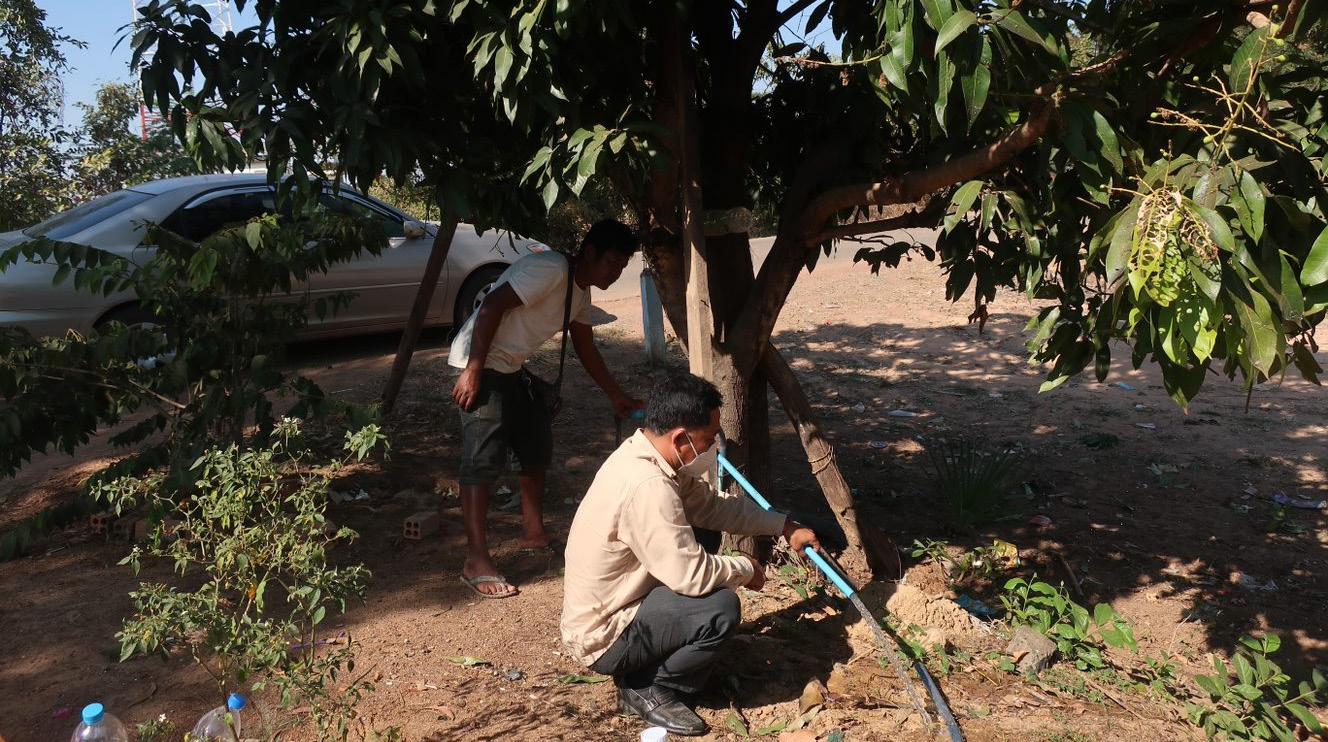
The lack of relevant climate and water resources data is another key barrier towards understanding current and future climate risks and their impacts on water security. A key focus area for WaterAid in PNG and Timor Leste is strengthening local data collection and monitoring processes for enhanced future planning.
In collaboration with Similie, WaterAid is working to improve rural community water management through the installation of configurable multipurpose loggers in community water supply tanks. These loggers provide real time data visualisations on water use patterns and behaviours within a given village including the adequacy of the water supply system that the community relies on. The ultimate purpose is to build the capacity of local communities and water managers to monitor, manage and protect their water resources.
The project began with a workshop facilitated by WaterAid with the District WASH coordination body in Wewak to build awareness around

climate change concepts and the importance of localised data sources.
Climate resilient water resource management and advocating for rights to WASH remains a key focus area for WaterAid. Our work is continuing to create meaningful relationships across institutions to foster holistic policy development, increased technical capacity and greater awareness around the importance of climate resilient WASH.
Example outputs of data loggers showing community water use patterns and behaviors

11
Field practice for water quality testing training and workshops
WaterAid
WaterAid
Water
Galvinising action on Menstrual Health across the Pacific
Water is essential for women, girls and people who menstruate to be able to manage menstruation hygienically and comfortably, to bathe privately, to wash their hands, and to drink enough water during that time of the month. Unfortunately, this is not a reality for thousands of women and girls living in the Pacific, which has some of the lowest rates of water coverage in the world. Just 57% of people in the Pacific region have access to basic safe drinking water, and water for hand hygiene remains a significant challenge with only 36% of households in the pacific region having a handwashing facility with soap and water near their toilet.
This past year marked the second year that WaterAid has been working to strengthen Pacific-led menstrual health collective action. The ‘galvanising action on the Pacific menstrual health’ project is working to: establish and drive a regional multi-sectoral menstrual health network, strengthen collective advocacy, action and share learning, and to understand key opportunities to bring about improved menstrual health outcomes across the Pacific.
WaterAid supports seven local rights-holder organisations made up of local CSO’s and small businessesto lead the network across five Pacific

Island Countries: Fiji; Papua New Guinea; Samoa; the Solomon Islands and Vanuatu. The group have built increasing momentum over the past year. In celebration of International Women’s Day the Network members produced and shared a video about who they were and the important work that they were doingas part of an online advocacy campaign
Over the past year and a half, WaterAid supported each partner to lead a scoping study to better document the menstrual health landscape in their country and to inform future practice. Together we have led a desk-review in each country; interviewed over 40 experts and held two workshops. The outcome is a regional report which documents the Pacific drivers, barriers and opportunities to strengthen menstrual health in the region. The Network published the landmark report on global Menstrual Health Day 2022, highlighting the policy and programming key recommendations needed for actors to progress.
The network also developed a short animated video to raise awareness of the importance of clean water in menstrual management and the unmet needs of menstrual health in the region. It was a call for greater action targeting national governments and donors. WaterAid has supported three partners to begin doing smallscale interventions to address menstrual health.
A young women washes her hands near her home at Yiwun Village, Wewak District, Papua New Guinea
12 | WaterAid Annual Report 2021/22
WaterAid/Dion Kombeng
Sanitation
How sanitation is keeping girls in school in Papua New Guinea


Access to decent sanitation in Papua New Guinea (PNG) is challenging, with fewer than three in ten people having access to a decent toilet. This issue extends to schools in the country, with over half the schools in PNG lacking access to a decent toilet. Without access to these facilities, students often have to leave school to use a toilet or miss school altogether. Lack of access disproportionality affects girls, who without a space to safely manage menstruation, often miss many hours of school when on their periods. The most recent study done by UNICEF in 2018 found that only 17% of schools in PNG have proper WASH facilities to manage their periods safely and with dignity. It also found that girls can miss up to three days of school a month when they stay home due to not having adequate facilities to manage their periods. This finding has been confirmed from the baselines carried out by WaterAid PNG in the schools we support. With the support of our partners, we have provided inclusive WASH facilities to 4,372 (1957 females, 2415 males) primary schools students in six schools in Wewak District and Central province in FY22.
Each of the WASH facilities include the standard design of toilets for boys and toilets for girls, one urinal for boys, one menstrual hygiene management (MHM) unit, water reserve water tanks and two toilets (one male, one female) specifically designed for persons with disabilities.
The standard designs are further contextualized by detailed baselines conducted for each school before implementation, which determine the number of standard toilets, and capacity of water storage as well as the type of water supply system. WaterAid has worked closely with our key partners on this project, including the provincial and district governments including the Education Divisions in project design including school selection. This process has ensured the WASH services are reaching the most needed.
At the opening of their new inclusive WASH facilities, Ginigolo Gunugau Primary School
Student Representative Head Girl Maura James said she was grateful on behalf of the 471 students for the 11 new toilets that will replace the two old ones that the school was using.
“Our girls will now no longer go home and miss classes during menstruation because now we have a safe place,” she said, referring to the new MHM building built.
Students outside WaterAid toilets at a Primary School in Rigo District, Papua New Guinea
13
Celebrations of the opening of a new inclusive toilet block at Gaire School in Wewak, Papua New Guinea
WaterAid/Dion Kombeng
WaterAid/ Tom Greenwood
Hygiene and COVID-19
Sokha washing her hands in front of the Thlork Vien health centre, Kampong Chhnang province, Cambodia.

Our response to COVID-19 was on a wide scale, and we continue to respond by implementing COVID-19 sensitive hygiene behaviour change programmes –embedding key COVID-19 learnings and behaviour change principles.
As leaders in the water, sanitation and hygiene (WASH) sector, we have always promoted handwashing with soap and water as part of our ongoing behaviour change programming, but over the last two years the importance of these behaviours was reinforced by the emergence of COVID-19. Working with individuals, communities, and governments, we have been leveraging our programs to help prevent the spread and impact of COVID-19.
We proactively scaled-up our hygiene behaviour change work through government-led mechanisms in 28 countries. We rapidly applied a behaviour centred design (BCD) approach and targeted behaviours that are sensitive to prevent the spread of disease, including hand hygiene.
Our branded and trusted hygiene campaigns reached 181 million people, distributed 1.8 million hygiene products, including soaps and sanitisers, and delivered 2,700 large-scale innovative handwashing facilities in key public places.
We also contributed to sectoral coordination mechanism through water, sanitation and hygiene (WASH) and health clusters, and through various international platforms including the Hand Hygiene for All (HH4A) initiative.
Our key COVID-19 principles to follow when implementing hygiene programmes include:
• Having clear Theory of Change (ToC) and process for design and implementation.
• Focusing on key behaviours- behaviour change is central to the response of health crises.
• Integration is key to improve programmes and reach larger numbers of people.
• Use a system strengthening approach.
14 | WaterAid Annual Report 2021/22
WaterAid/Remissa Mak
• Handwashing facilities should be innovative in design and provision should have a clear operation and maintenance plan.
• Sustainability must be at the heart of the programme.
• Equality and inclusion to be imbedded from the start.
• Monitoring and evaluation (M&E) are key for longterm success.
When we first started responding to COVID-19 in March 2020, it was a very new disease with not much information available. Countries around the world were entering different phases of lockdown, businesses were closing, people were working from home and a general sense of the unknown spread globally. As leaders in WASH and hygiene behaviour change, we immediately stepped up to help fight the spread of COVID-19. Over the past two years, as the world has slowly learned to live with the disease, we have gained immense learnings through new evidence, research, case studies and of course, our failures.
We will continue to draw on these experiences as we work with partners throughout the globe to respond to COVID-19 and other disease and continue to advocate on the importance of hygiene for human health, well-being and economic prosperity.
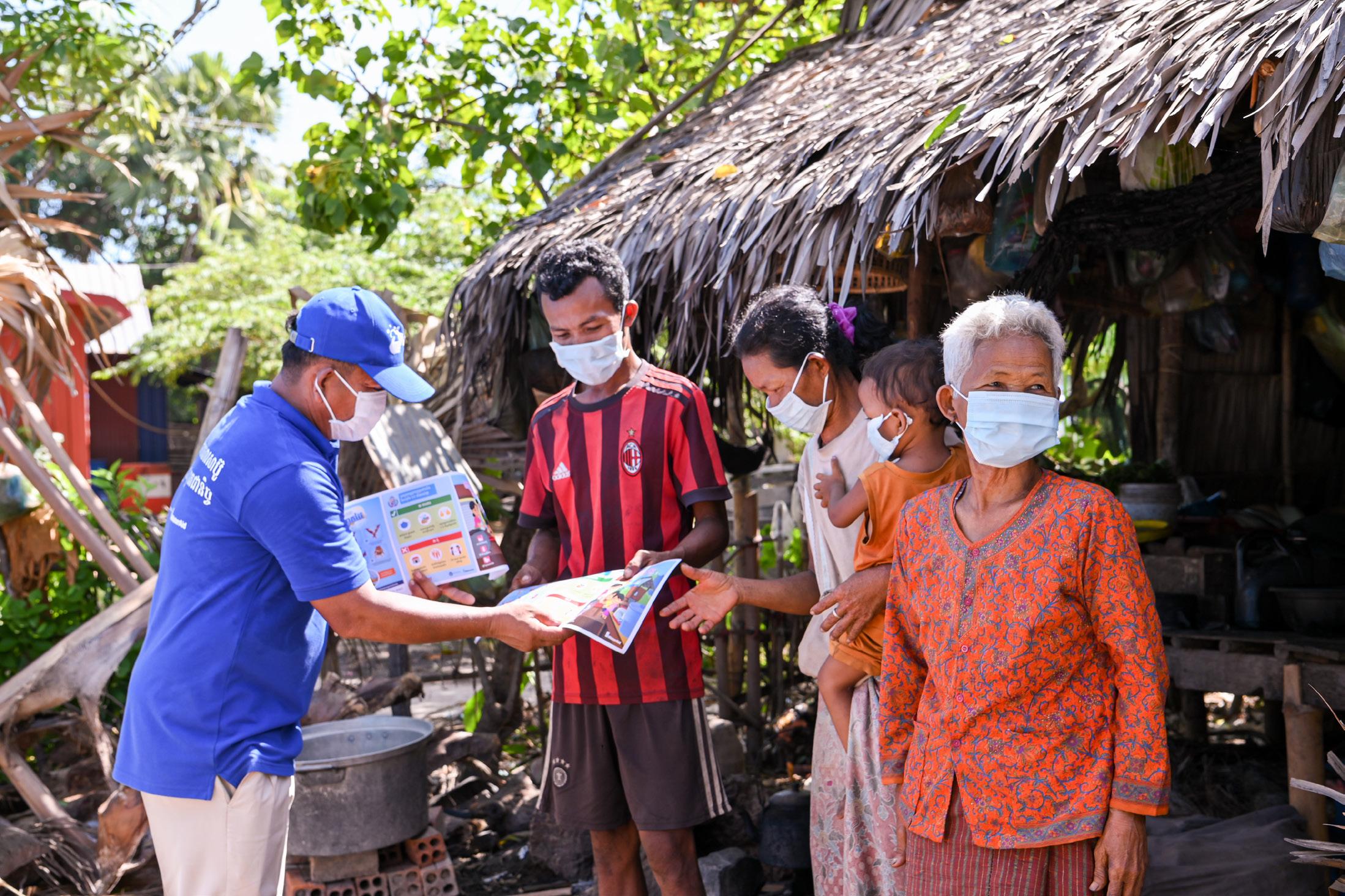
15
Working with sub-national government and WaterShed Ventures to provide necessary materials (masks, hand sanitizer, soap, PPE, mobile handwashing facilities–Labobo) to Covid-19 affected communities in Kampong Chhnang Province, Cambodia.
WaterAid/ Ly Heng
Our Work in Healthcare Facilities
Adequate water, sanitation and hygiene (WASH) in healthcare facilities (HCFs) is critical to the delivery of high quality and safe care.
This is particularly significant for services during labour, delivery, and postnatal care when the health of mothers and newborns can be severely impacted by poor WASH services. Additionally, adequate WASH in HCFs is essential to uphold infection prevention and control during disease outbreaks such as COVID-19.
Globally we are still seeing huge gaps in basic wash services in healthcare facilities.
Cambodia
The Changing Hygiene Around Maternal Priorities (CHAMP) Plus research project aims to improve the hygiene behaviours of midwives, mothers, fathers, caregivers and visitors that influence maternal and neonatal infection during labour, delivery and post-natal care in healthcare facilities.
Improving cleaning practices is essential to reducing healthcare associated infections, including the spread of COVID-19 and tackling antimicrobial resistance. Clean Frontline is a research project targeting cleaners who are critical frontline workers responsible for cleaning HCFs and improving infection prevention and control. Both these research projects are in partnership with the London School of Hygiene and Tropical Medicine (LSHTM) and the Ministry of Health - National Institute of Public Health (NIPH).
Timor-Leste
WaterAid in partnership with the Ministry of Health and other key stakeholders are implementing a Municipal-led sustainable WASH in healthcare facilities and communities project. The project focuses on improving access to WASH in HCFs and communities in two selected rural locations to demonstrate how using an integrated approach can accelerate government plans for reaching municipal-wide hygienic status.
Papua New Guinea
Papua New Guinea (PNG) has ambitious targets of achieving access to safe, convenient, and sustainable water supply and sanitation facilities in 100% of medical centres (hospitals, health centres, aid posts) across the country by 2030. In partnership with the National Department of Health and the National WaSH Programme Management Unit (PMU), WaterAid is conducting a situation analysis and assessment of WASH in HCFs in PNG.
Three staff members at Svay Chouk Health Centre in Kampong Chhnang Province where both the CHAMP project and the ANCP project for WASH in HCFs are taking place.

16 | WaterAid Annual Report 2021/22
WaterAid
Our Work in System Strengthening
Quality, timely and accessible data is critical to the WASH sector to enable evidence based planning, budgeting, policy making and decision making. Strong data drives inclusive, sustainable and resilient WASH services.
In Papua New Guinea (PNG), the lack of reliable and timely data on WASH services hinders the planning and coordination of WASH service delivery across the country.

With WaterAid’s support, the PNG Government’s Department of National Planning and Monitoring WASH Program Management Unit (PMU) established PNG’s first WASH Management Information System (MIS) in 2018. The MIS uses a mobile phone-based application called mWater for the collection, management and use of WASH data. The government and other organisations working in WASH such as NGOs collect data using standardised survey forms with all data then flowing into the MIS for use by decision makers.
In 2022, we drew on our lessons and experience in Wewak District, East Sepik Province to provide support to the WASH PMU, South Fly District and World Vision to put the MIS into practice by supporting South Fly District Development Authority (local government) to develop South Fly District’s first five-year investment plan.
Together with the WASH PMU, WaterAid trained 35 government officers in South Fly district on the MIS and data collection processes. Over a ten week process government officers collected data from remote rural communities, schools and health care facilities. Through this process the data collection team successfully gathered WASH data from all 157 rural communities, 115 schools and 26 health care facilities across all five local level government areas.
The South Fly District WASH committee and its decision makers have used this data to prioritise communities, schools and health care facilities in most need of investment in critical infrastructure such as climate resilient water supply and support
for the promotion of sanitation and hygiene improvements.
The five-year plan development process has provided South Fly District with the valuable opportunity to evaluate who has critical roles and responsibilities for planning, financing and delivering WASH services. Using their data-driven plan helps them to adopt new approaches, leverage additional finance and improve WASH service for the people of South Fly District.
The collaboration in South Fly is an example of WaterAid’s approach to strengthening government systems, so that lasting water and sanitation services, and hygiene behaviours will be owned and sustained by government long after WaterAid’s projects have ended.
17
Public Health Authority staff using the mwater survey tool to collect WASH data in Wewak
WaterAid
Papua New Guinea

to apply for 11 million Kina (approx. $4.5 million AUD) Public Investment Program funding through the Department of National Planning and Monitoring (DNPM) to complete the implementation of the five year Wewak District WASH Plan. The submission is so far looking positive.
FY22 was a year of growth and expansion for the WaterAid Papua New Guinea (PNG) team as we increased the number of grants and projects being implemented, as well as our budget and team. This allowed even greater impact in country, and reflected our ongoing success.
WaterAid PNG continues to take an overall systems strengthening approach, working with national and subnational government departments and stakeholders to support the overall rollout of the National WASH Policy. Key achievements this year included:
• We were able to leverage the evidencebased Wewak District WASH Plan to secure additional private and public funding. This has allowed extensive piloting and testing of the recommended inclusive service delivery model, and increased the capacity of the Wewak District WASH Coordination Body to roll this plan out. Improvements to WASH infrastructure for better health and well-being outcomes have been made in 13 communities. WaterAid also supported the Wewak District Development Authority
• At the subnational level, WaterAid PNG has continued to engage with a wide range of stakeholders to advance the systems strengthening component of the “Strengthening sector systems to ensure universal, equitable and sustainable WASH in Papua New Guinea” project (funded through DFAT’s Water for Women program), and continue to transfer leadership, ownership and drive of the Wewak District WASH Plan to the subnational government departments.

• At the national level, WaterAid PNG supported the National WASH Project Management Unit (PMU) and National Department of Health (NDoH) to revive the national WASH in Health Care Facilities (HCF) Technical Working Group (TWG). We also engaged a local consultant to conduct a situational analysis that will inform the roadmap to develop the National WASH in HCF standards with support from the TWG.
• WaterAid has supported the establishment of a Sanitation and Hygiene Working group which implemented a national Open Defecation Free advocacy campaign.
• Leveraging existing partnerships, WaterAid PNG facilitated negotiations and relationship development between the Motu Koita Assembly (MKA) and the national utility Water PNG to enter into a Memorandum of Agreement (MoA) to re-connect a reliable
18 | WaterAid Annual Report 2021/22
New toilet blocks in Chimbu, Papua New Guinea
WaterAid/John Faunt
water supply into Pari for the 8,000 native villagers as well as surrounding settlers. A pilot model of water delivery will be trialled under this project and if successful will be rolled out to the remaining eight MKA villages, and may be used as a model for peri-urban water supply throughout PNG.
• WaterAid PNG has further supported the National Department of Education (NDoE) by drawing from our WASH in schools work to contribute to a review of the 2018 WASH in Schools policy and guidelines in late 2021. WaterAid PNG’s role has been of technical input and facilitation amongst stakeholders to support NDoE to lead this work.
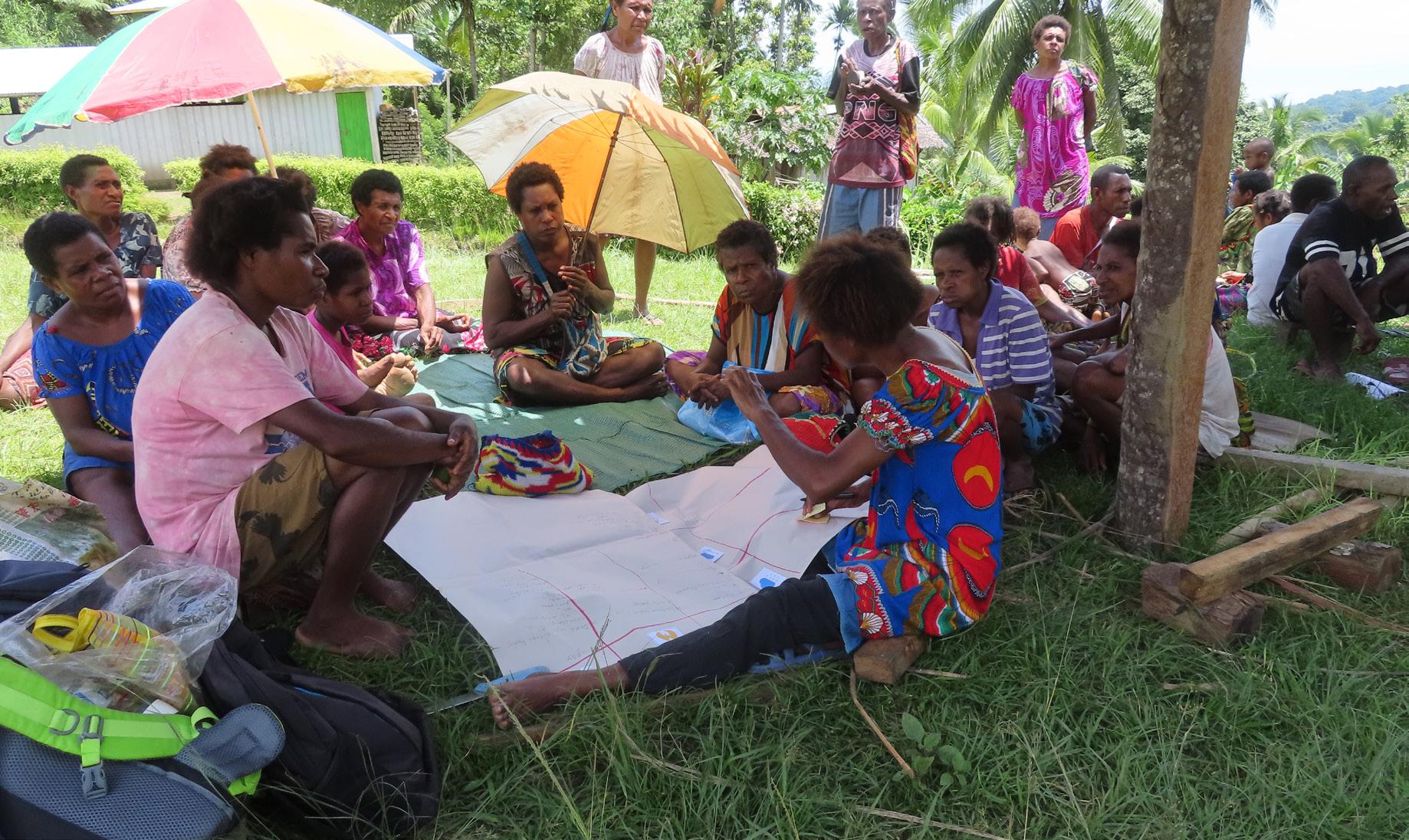
• WaterAid also improved access to water, sanitation and hygiene infrastructure for eight schools and 5,348 students in Central Province and Wewak District, as well as increased their awareness of health and hygiene measures (including menstrual hygiene management).
• In partnership with Netball PNG and Netball Australia, WaterAid is delivering the One Netball PNG project. In September and October 2021, a Come and Play session was delivered to 18 students (11 boys and 7 girls) in partnership with Special Olympics (all students have disabilities). Come and Play uses Netball to engage students in a fun and interactive program that also teaches hygiene, health and life skills.
Total Expenditure in FY22
$2,663,786.49
Locations of Projects
National, National Capital District, Central Province, East Sepik Province
Funders:
• Armani’s Acqua for Life
• Church Partnership Program (Australian Government)
• Team Up Sport For Development Program (Australian Government)
• Australian NGO Cooperation Program
• Water For Women Fund (Australian Government)
• The Coca-Cola Foundation
• East Sepik Provincial Government
• Latter Day Saints Charities
• The SMEC Foundation
• Who Gives a Crap
• Corporate, foundation and supporter contributions
19
A community engagement meeting in Walanduon
WaterAid
Timor-Leste

The WASH sector in Timor-Leste has undergone significant transformation in the last year. The Directorate General for Water and Sanitation (DGAS) has now been dissolved and responsibilities transferred to two new institutions: a national water and sanitation authority (ANAS) and public water utility (Bee Timor-Leste, or BTL).
We have worked hard in the last year to cement strong relationships with both ANAS and BTL at the national level, and have advocated for the importance of WASH planning and policy in the transformation process.
WaterAid Timor-Leste has continued to focus on collaboration with local implementing partners to deliver WASH services, strengthen national and municipal government systems, influence WASH sector resourcing, and champion WASH as a human right.

Notable achievements this year included:
• Working in partnership with local disability rights organisation RHTO, we have advocated at both the national and municipal level for the development of a People with a Disability Action Plan, which will be ratified by the Ministry of Public Works in 2022. This stipulates national guidelines related to inclusive and accessible public infrastructure, and builds on work done in partnership with CBM this year to develop the “Transforming disability rights through WASH: A Programming Framework”.
• We have continued working with local women’s organisations GFFTL and FAS to facilitate gender dialogue modules with local water user groups (GMFs) that challenge gendered divisions of labour in household WASH responsibilities, and promote women’s leadership in the WASH sector.
• WaterAid Timor-Leste continued to sit on municipal and national COVID-19 taskforces this year to provide technical sanitation and hygiene expertise. This included work with the Health Department to provide COVID-19 health promotion materials and menstrual hygiene management training to teachers in Manufahi and Liquica, and the distribution of face masks, soap and hand sanitiser.
• We supported municipal authorities to conduct a Life Cycle Cost Analysis to determine the costs of providing and sustaining WASH services in all healthcare facilities across Manufahi. This information may now be used by HCFs and municipal
WaterAid/Agui
20 | WaterAid Annual Report 2021/22
A man washes his hands at new WASH facilities in Turiscai, Manufahi
government alike to advocate for evidencebased, specific WASH budget amounts to be able to install and maintain vital WASH services with the hope to improve health outcomes in the future.

• WaterAid continued to collaborate closely with national WASH civil society network PNBESITL, supporting them to make a formal budget submission advocating for greater allocation to WASH service provision and maintenance. As a result of this submission the national WASH budget allocation was increased from 0.7% to 1.8%.
• WaterAid has been working to strengthen the existing national WASH monitoring system in Timor-Leste so that strong, reliable and timely WASH data can be collected and shared at national, municipal, and community levels to inform water resource management decision-making, and increase community climate resilience.
Expenditure: $2,283,629
Locations of Projects: Dili, Liquica, Manufahi
Funders:
• Water for Women Fund (Australian Government)
• ANCP (Australian Government)
• Australian Water Partnership (Australian Government)
• Swedish International Development Cooperation Agency
• US Department of Agriculture (McGovern-Dole Program)
• Who Gives a Crap
• Corporate, foundation, and supporter contributions
WaterAid/Agui
A new inclusive WASH facility at a healthcare facility in Manufahi
21
Cambodia
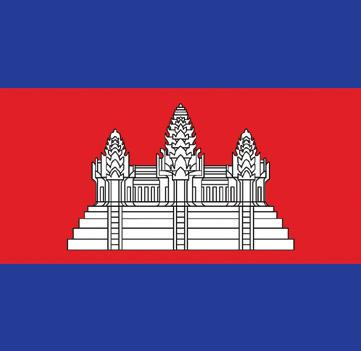
Throughout FY22 WaterAid Cambodia continued its focus on reaching marginalised groups who are disproportionately affected by the impacts of COVID-19, climate change, and poor working conditions. We worked alongside local partners, and engaged with national and sub-national administrations to influence WASH policies with a strong focus on systems strengthening and sustainable WASH services.

Key achievements this year included:
• Working with local NGOs and the government to deliver the Royal Government of Cambodia’s National Action Plan set to ensure every Cambodian has access to water, sanitation and hygiene by 2025. To improve water security at district level, WaterAid, in collaboration with government institutes and their partner CWA, have been implementing a project to bring together expertise in water resource management, gender equity and social inclusion, community development, behaviour change communication and systems strengthening.
• In collaboration with relevant stakeholders, we conducted a feasibility study on water resource management (WRM) and collected baseline information in Samaki Meanchey in order to understand the context of WRM and climate resilience. The study has also obtained qualitative and quantitative information for the purpose of developing a gender sensitive and inclusive water resource management strategy for the district, improve capacity and district leadership in WRM strategy development, and to build collective action and engagement of WASH and WRM sector stakeholders.
• With our support, a district-wide gender sensitive and inclusive water resource management plan was developed and
integrated into the Commune Investment Plan (CIP) and District Investment Plan (DIP) of Samaki Meanchey district. This has been a great achievement to increase local ownership and continuation of the work to ensure marginalised groups are included in district water resource management.
• Working closely with sanitation workers in Battambang province to highlight the unsafe work conditions and stigma of sanitation work. While sanitation workers play a critical role in safely managed sanitation, it was identified that sanitation workers themselves are vulnerable to hazardous working conditions and often experience social stigmatisation and exclusion. WaterAid supported this group through an innovative program which helped to explore the challenges faced by sanitation workers through arts workshops and creation of unique works of art by participants. A public art and photo exhibition was hosted by WaterAid to support sanitation workers to share their experiences and to get support from policy makers to improve working conditions. We also supported through the
22 | WaterAid Annual Report 2021/22
WaterAid
A woman in Kampoing Chhang has her property connected to a water source for the first time through the VF fund, in collaboration with our partners CWA.
A man clears waste from a sewer in Battambang province

provision of personal protection equipment such as boots and gloves.
• Redirected funding to roll out COVID-19 response activities in 16 factories, across five provinces and reaching 280,884 people. The garment, textile and footwear industry in Cambodia represents the largest portion of the country’s manufacturing and employs over 700,000 workers in over 800 factories. WaterAid currently works across multiple
Expenditure: $2,866,374
Locations of projects: Battambang, Kampong Chhnang, Kampot, Kratie, Kandal, Kampong Speu, Svay Rieng

Locations of projects:
• Kampong Chhnang
• Kraite
• Kandal
• Kampong Speu
• Svay Rieng
Funders:
factories to improve access to WASH and hygiene behaviour practices for workers in factories and surrounding communities where factory workers and their families live. Community behaviour change campaigns incorporated WASH Family Champions to support messaging and good practice, as well as use of mobile campaign cart boxes which were driven around communities with hygiene messaging and graphics.
• ANCP (Australian Government)
• Water For Women Fund (Australian Government)
• ANCP (Australian Government)
• 3i (Australian Government)
• Who Gives A Crap
• H&M Foundation
• Swedish International Development Cooperation Agency - SIDA
• UNICEF - Accelerating
Sanitation and Water for All
• VF Corporation
• VF Foundation
• Australian Water Partnership
• WaterAid UK - Innovation Funds
• Mr. Harold Bentley
• Agenda for Change
• Corporate, foundation, and supporter contributions
Mobile campaign cart box
WaterAid/Dos Sereyvoath
23
WaterAid
Our Supporters
Thank you to all our amazing supporters
WaterAid Australia has supporters all over the country generously supporting and advocating for the cause. Our fundraising appeals allow us to share the stories of those who lack access to clean water, decent toilets and basic hygiene, and the impacts this has across the globe with our existing and new supporters. We are always deeply humbled by the support we receive for our mission by individuals.
In the last year, we ran a range of fundraising appeals including a focus on the intergenerational challenges women across the world face without water through the story of Rani and her daughter, and the need for WASH in healthcare facilities through the eyes of healthcare workers who

continue to risk their lives for their patients, and the story of Susmita and her dangerous walk to collect water for her family.
We also continued to adapt our approach to fundraising while facing a pandemic and lockdowns across Australia. Fundraising at stands in shopping centres is a key way for us to spread our message and meet and discuss our mission with potential new supporters. During the year we expanded our presence in shopping centres working with new partners in new locations. We enjoyed meeting and talking to our supporters across Australia and deeply appreciated the overwhelming encouragement and support we received.
24 | WaterAid Annual Report 2021/22
WaterAid/Fabeha Monir
Beci Orpin x WaterAid Australia
We were fortunate enough to team up with Melbourne-based artist, designer and illustrator Beci Orpin to create several beautiful new products for WaterAid’s Gifts For Life range. Our Gifts for Life products are a unique gift idea, with each card and tote bag providing a donation to help WaterAid achieve it’s mission.

The products are instantly recognisable as Beci’s work, with gorgeous colours and geometric designs, both featuring small nods to WaterAid’s vital work in ensuring everyone, everywhere has access to clean water, decent toilets and good hygiene.

On the collaboration, Beci said:
“We all take clean water and decent toilets for granted, forgetting that this is not the case for millions of people around the world. I was thrilled to be able to design the new products for WaterAid, to raise funds for the organisation’s water, sanitation and hygiene projects, and supports their lifesaving work.”
Melbourne Marathon - Raj
A big congratulations and thank you to supporter Raj who raised funds for WaterAid in October by running the Melbourne Marathon. Here’s what he had to say about the experience.

“Having witnessed water related issues growing up in an Indian village, I could closely relate to the stories shared by WaterAid. Being fortunate enough, over the last few years I have been staying in Australia and enjoying safe water, good sanitation and hygiene. This made me realise it is unfair for someone to still face these issues in the 21st century”.
The Water Challenge
Supporters all over Australia chose to give up all beverages except water for the month of March to raise money and awareness for WaterAid through participation in the Water Challenge.
Lucy raised $912 for the Water Challenge
“I’m 18 and saw an ad for the Water Challenge and so I signed up. Little did I know that this would be so life changing for me and others. I’ve always been really affected by the struggles of others in the world and when I saw this I knew this was a fundraiser I could do to have an impact in someone else’s life. Sometimes in Australia we can be ignorant to the reality of other’s lives because we have so much and I really appreciate the opportunity to go without any other drinks for the month of March to raise not just funds but also awareness of the reality of individuals and communities all around the world.”
25
Gender Equality and Disability Rights

Gender inequality is made worse by weak water, sanitation and hygiene (WASH) systems and services. WaterAid strives to empower women and girls through our efforts to improve WASH services across countries and regions. A gender equality and human rights approach underpins WaterAid’s new Global Strategy 2022 – 2032: Ending the WASH Crises Together – for everyone, everywhere. Gender outcomes are core to each of the four global aims, and WaterAid has made a fresh and deeper commitment to strive for women and girls to be a central part of decision-making and leadership within WASH, at all levels, so their voices are heard and their needs are met.
A key tactic we have successfully applied over the past year is to strengthen women and gender rights organisations to be WASH leaders. We have also done this together with people who have disabilities and their rights organisations. We support women and people with disabilities to be decision-makers who are driving work on WASH governance systems in the countries where we work. Below is a snapshot of some key programming achievements in gender and disability rights in Asia and the Pacific.
26 | WaterAid Annual Report 2021/22
Yan (84) walking down a ramp from the disabled user-friendly toilet at the Thlork Vien health centre, Chhouk Village, Cambodia.
WaterAid/Remissa Mak
In Cambodia, the WaterAid team led the ‘HerRoles’ campaign over the past year, supported by Who Gives a Crap. The campaign promoted women’s WASH leadership as the sector is predominantly male-dominated. The campaign rolled out a series of podcasts, live public dialogue events and story-telling through creative platforms to raise awareness. 11 women working in senior WASH roles undertook a leadership course to improve skills, knowledge and self-confidence and to foster role modelling to others. The campaign also mobilised men working in WASH in government and nongovernment sectors to publicly commit to take actions to champion gender equality through a series of high-profile public dialogue sessions.

“After participating in HerRoles campaign, it got me realize that leadership has not position; everyone can be a leader of their own-self” a representative from the Ministry of Rural Development, Cambodia
Over the past year in Timor-Leste, we partnered with the Institute for Sustainable Futures (University of Sydney) to undertake research to better understand the drivers, barriers and opportunities of partnering with gender rights organisations. The research found that working together in partnership led to an increase in participation of women and increased the scope of the local rights organisations work, contributing to their strategic plans. As one research respondent said:
“Women’s groups speak out about WASH problems in the communities. I think the big change is that community aspiration reached the parliament. They also had a meeting with the women’s parliament group.”
Partnership activities led to a positive change in the community’s perspective on engineering, which was now considered to be a job that both women and men could do.
This year our teams in Cambodia and TimorLeste also published academic journal articles which measured our gender empowerment outcomes through WASH. The review found that household gender equality changes in Timor-Leste were empowering because they shifted women’s and men’s roles, relationships and attitudes. It found that women’s leadership approaches in Cambodia achieved inclusive outcomes because they enhanced women’s critical consciousness. There was evidence of either individual/self-empowerment changes or changes to the enabling environment. The authors conclude by achieving empowerment outcomes in WASH, there can be a positive shift in gender norms, redistribution of power and benefits to women.
“...after I joined a lot of activities with WaterAid such as women leadership and inclusive WASH training, I have gained much knowledge on WASH and I have confidence to push and speak with community people and senior government leaders in WASH.”
(Interview with woman training participant, Cambodia).
27
WaterAid/Vlad Sokhin
Isabel, 55 (left) and Olinda, 59 (right) washing clothes in a bucket using water from a community tap stand in Timor-Leste
Our Corporate Partners


WaterAid receives substantial and essential support from the corporate sector.



We recognise and thank the following organisations for their support of WaterAid globally:
Global Parnters National Partners
We recognise gratefully the following companies who partner specifically to support WaterAid Australia’s work in Cambodia, Papua New Guinea and Timor-Leste:



Membership provides engagement on important global issues and access to valuable corporate programs. Many members are also generous sponsors and their staff are active fundraisers for the cause.


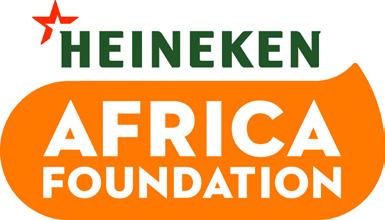


Gold Members

28 | WaterAid Annual Report 2021/22
Silver Members





Entry LevelMembers








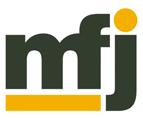

Thank you to the following organisations who generously sponsored our corporate events in the past year:














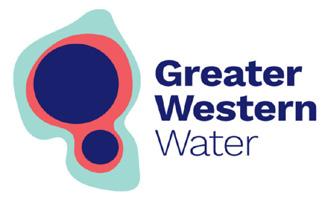














Sponsors/supporters





















29
Strategic Partnerships
The past 12-months saw the return of much more in person engagement with our strategic partners (members, sponsors, corporate partners and major donors) which gave us the opportunity to strengthen and renew many partnerships and collaborations.
The annual Walk for Water corporate event was held from 18 – 22 October 2021 with over 600 registered participants walking, running and riding to raise over $245,000 to support WaterAid’s water, sanitation and hygiene projects. We launched a new Walk for Water ‘Water Leaders Challenge’ that enabled leaders to advocate for the event and WaterAid increasing engagement. This was a huge success and we thank all our Water Leader ambassadors for their support and advocacy.
38 WaterAid members continued their support for WaterAid and utilised our program to also engage their staff and customers on our work and why Sustainable Development Goal 6 is such a critical global challenge.
We had over 100 of our members and corporate supporters join us on an interactive ‘Virtual Supporter Trip’ to Nepal, with our supporters able to gain unique insights into WASH projects and the communities WaterAid works in.
We also recognise the support of our corporate partners and donors such as Who Gives A Crap, SMEC Foundation, AIDAN the Brand, Aquamamma, ClearBridge Investments, Footprints, Naked Sheets, and Ostara.
Corporate Partner –AIDAN
As the world reopens and international travel resumes its time to pack your suitcase and go on an adventure. WaterAid is thrilled to announce a partnership with AIDAN, a luggage and accessories lifestyle brand which ensures a seamless travel experience.
AIDAN is helmed by eponymous founder Aidan Walsh, the brand is an expression of inner creative vision, born from relocating to work and live overseas and being inspired by an international way of living and consuming product that blurs the lines of fashion, people and culture. AIDAN advocates for those in the community that need a voice. Growing up in Western Australia, Aidan has always had a strong connection to the water and the sea. His mission is to help shed light on the importance of enabling the world’s poorest people the ability to gain access to fresh water. AIDAN has pledged a percentage of its revenue each year to WaterAid.

30 | WaterAid Annual Report 2021/22
Aidan
State Fundraising Committees
WaterAid is very fortunate to have volunteer fundraising committees and ambassadors in most states, including NSW, QLD, SA, WA and VIC, who each raise significant funds for our water, sanitation and hygiene (WASH) projects.
The individuals who volunteer for these positions span across the water sector, with a variety of professions and skills, and experience can range from graduates through to directors and executives.
The State Fundraising Committees have continued to be an integral part of WaterAid Australia, creating fundraising records throughout the COVID pandemic and building our network of supporters within the water industry and further afield.
We were able to hold several events across Australia including the Queensland Gala Ball, Trivia Night and Golf Day; Western Australia Wine Wall; South Australia Gala Ball and Soccer Tournament; New South Wales Golf Day and End of Summer Cocktail Party and the Victoria Gala Ball raising more than $740,000 towards WaterAid’s work.
We thank all our committees, ambassadors, sponsors and attendees that make these events so successful and also a highlight of the water sector social calendars.
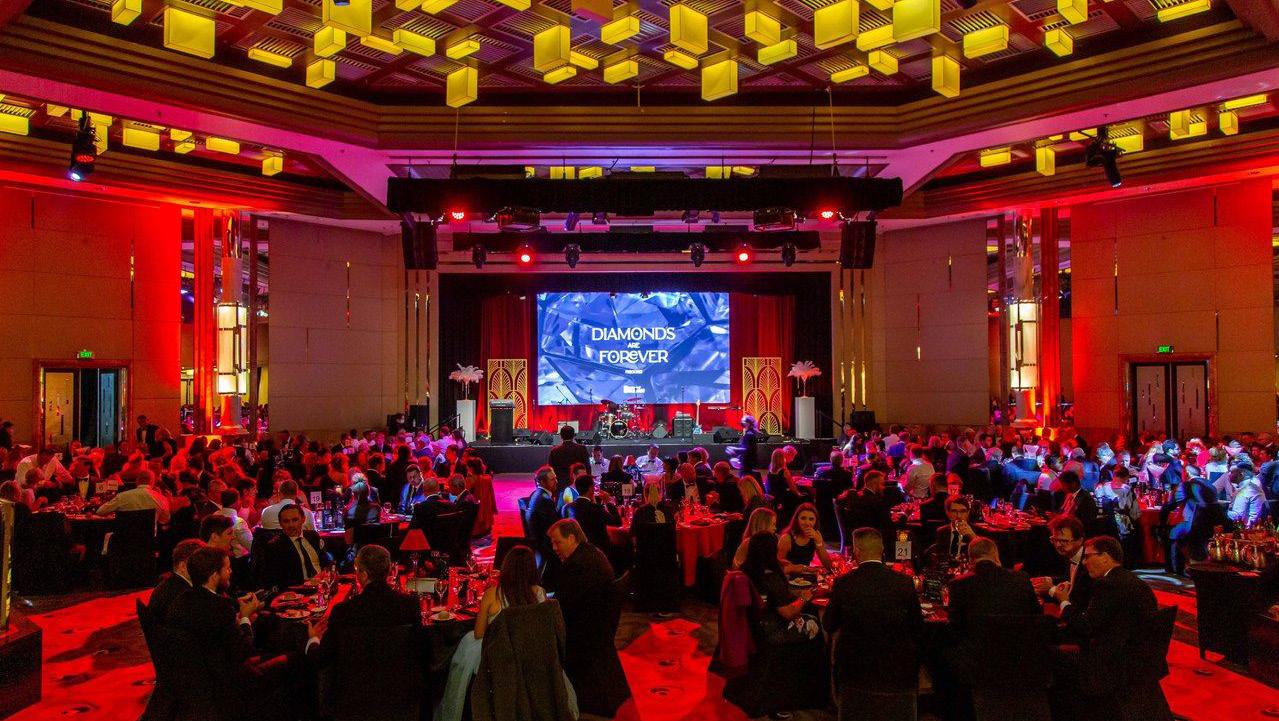
31
This year’s theme for the Victoria WaterAid Gala Ball was Diamonds and Forever
WaterAid/ Nigel Welch
Who Gives A Crap Impact Accelerator
WaterAid has enjoyed a proud partnership with Who Gives A Crap since they were founded in 2012 and together we are having an impressive impact all around the world. This innovative toilet paper (and other products) B corporation are committed to donating 50% of their profits to helping build toilets and improving sanitation in the developing world, so for WaterAid this partnership is the perfect match!

Who Gives A Crap has experienced impressive growth in the last two years and the impact of the resulting funding has been felt across WaterAid globally with programs supported in Cambodia, Colombia, Nicaragua, India, Papua New Guinea and Timor-Leste.
Who Gives A Crap and WaterAid Impact Accelerator!
This year we were excited to launch the first round of the Who Gives A Crap and WaterAid Impact Accelerator, a program dedicated to trialling new approaches to solving some of sanitation’s biggest issues.

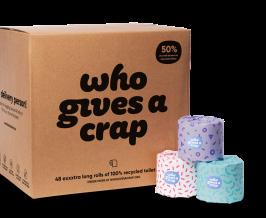
The Impact Accelerator focuses on innovative and scalable approaches to current problems and neglected areas of sanitation. It also looks to identify ideas to attract additional ongoing investment from other government, non-government and private sector funders, to secure large scale impact. Central to the Impact Accelerator is a commitment to sharing which initiatives are succeeding, which are failing and why, so the entire sector can benefit from its learnings. We want the fund to help the global community achieve its goal of everyone, everywhere having access to a clean and functioning toilet.
The first round of the Impact Accelerator was focused on the huge challenges faced by sanitation workers across three countries; Bangladesh, Cambodia, and India.
32 | WaterAid Annual Report 2021/22
The Problem:
In each of these countries, sanitation workers are some of the most marginalised and at-risk people in the work-force. The work they do impacts the collective health and hygiene of their countries, yet the discrimination faced by the people in this occupation is pronounced and far-reaching. The work is not regular or consistent in location, and involves various health hazards including handling toxic and hazardous materials, getting injured at work and an inability to call in sick with paid holidays.

The Solutions:
Bangladesh
Within this context, WaterAid Bangladesh focused on the plight of female sanitation workers, as the issues and negative effects faced by the sanitation workers as a whole are magnified for women, and even further overlooked. They produced a short film documenting the unheard and unseen difficulties of female waste and sanitation worker’s health, safety, and dignity. This included a dissemination campaign for the film which involved showcasing it on key media platforms, as well as with key media personal, arts communities and the local authorities.
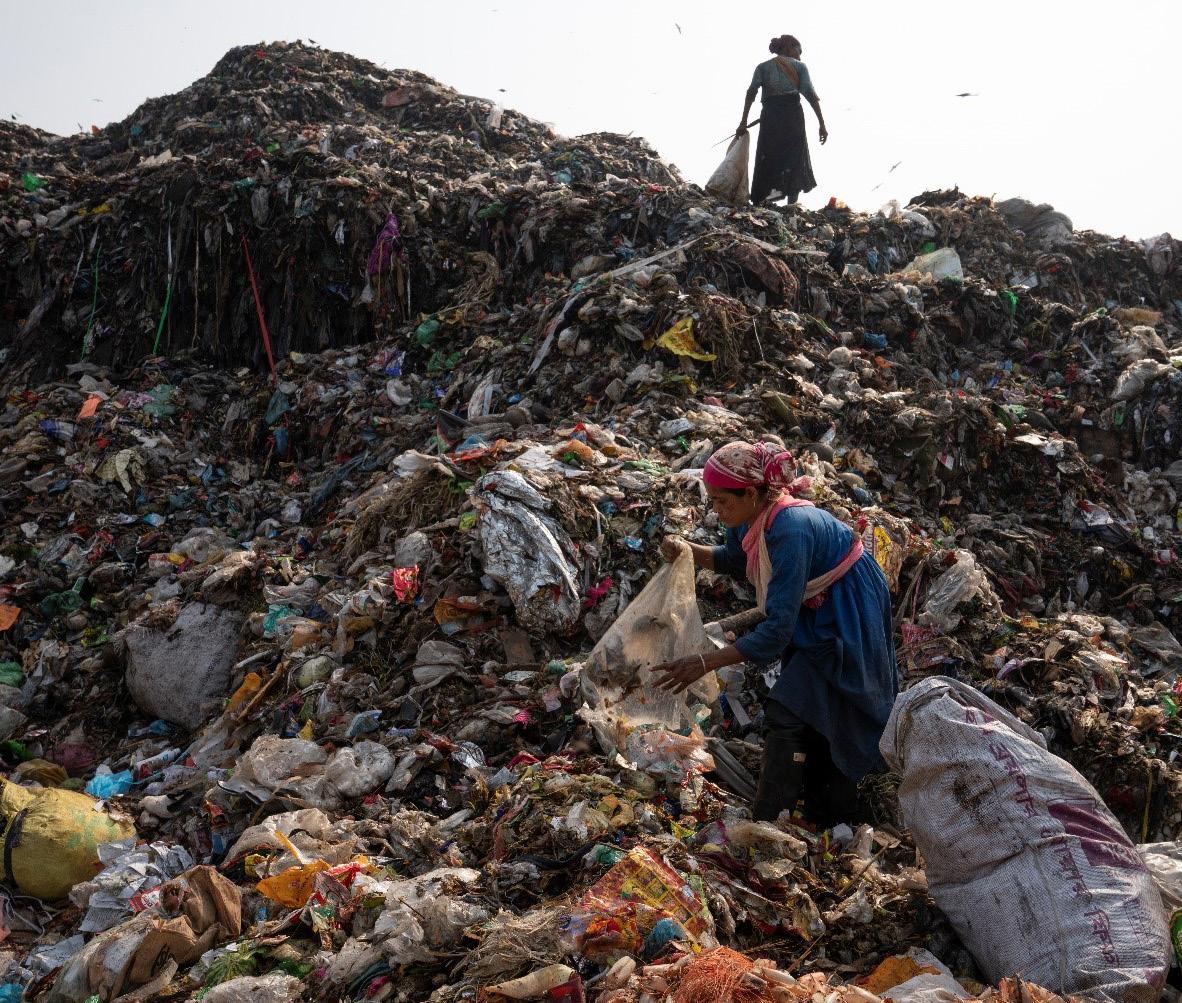
Cambodia
The Impact Accelerator program in Cambodia aimed to put sanitation workers in a position where their voices and demands are heard, where they are respected by local authorities, and where they are granted a fair and predictable income. It did so through the creation of unique works of art by the participants. A public art and photo exhibition was hosted by WaterAid to support sanitation workers to share their experiences and to get support from policy makers to improve working conditions.
India
WaterAid India focused on rural sanitation workers, and delivered training and support to professionalise their services. The project also developed a campaign to support government authorities to better understand the current status of rural sanitation workers, and with this understanding, help them to improve the rights and conditions of the workers.

33
Farida is a waste picker at the Matuail Sanitary Landfill in Bangladesh
Seyha and his colleagues unclog the sewer, Battambang province, Cambodia
Leadership Skill Development Training for faecal sludge management workers in India
WaterAid/Abir Abdullah
WaterAid/Dos
Sereyvoath
WaterAid
Directors’ Report
WaterAid Australia Directors present this report on WaterAid Australia Limited for the 12 month period ended 31 March 2022.
Financial overview: 1 April 2021 to 31 March 2022
Where did the money come from in 2021/22?
WaterAid Australia’s 2021/22 total income was $15.8m, a decrease of $1.4m or 8% compared to the prior year. In 2021/22, we successfully completed the fourth year of our major grant - Water for Women - funded by the Australian Government’s Department of Foreign Affairs and Trade “DFAT”. DFAT contributed significantly to our mission, by funding $6.3m of our work, representing 40% of our total income (2020/21: $5.8m or 34%).
2021/22 fundraising income was $6.6m, a 24% decrease on the prior year (2020/21: $8.7m). Support from the water sector remains an enormously positive component of our fundraising effort. WaterAid Australia also received total funding of $2.1m via other members of the WaterAid International Federation (2020/21: $1.6m).
Where did the money go in 2021/22?
Total expenditure in 2021/22 was $16m, an increase of $2.4m or 18% from the prior year (2020/21: $13.6m). Our programmatic work made up 72% of our total expenditure, fundraising costs were 19% and accountability and administration totalled 9%. We efficiently and effectively maintained our commitment to the Australian public of being a transparent and accountable organisation.
Income $15.8 million 42% Fundraising 40% DFAT grants
2% WaterAid UK
13% Other WaterAid member funds
3% Other grants and income
Expenses $16 million
71.9% Our work 19.4% Fundraising costs 8.7% Accountability and administration
Program expenditure $11.5 million
20% Program support
23% PNG and Pacific
25% South East Asia
20% Timor-Leste
10% Other
2% Community education
34 | WaterAid Annual Report 2021/22
Our Board
Top row: Karlene Maywald, Kate MacMaster, Mal Shepherd, Alexandra Owens, Robert Glasser, Heather Brown, Felicity
Green
Bottom row: Salmah Lawrence, Louise Dudley, Pat McCafferty, Rob Skinner, Kevin Young, Francois Gouws
The Hon. Karlene Maywald, Chair is Managing Director of Maywald Consultants Pty Ltd, providing specialist advice to the private and public sectors. Karlene’s time as a Cabinet Minister with the SA Government has given her extensive experience in high-level strategic planning, oversight of major infrastructure planning and delivery, reform of governance and organisational structures, budget oversight, change management, problem-solving across a broad range of high-risk sectors and driving the delivery of major policy reforms. She has an intuitive ability to analyse and identify key information to support decision making and a very good understanding of the importance of good governance. She uses her inquiring mind to seek innovative solutions to overcome obstacles and generate improvements to service delivery. Attended: 3/3
Kate MacMaster, Deputy Chair, is the Principal Consultant, Bendelta. She has two decades of cross-cultural experience, consulting in 16 countries across Australia and Pacific, designing, implementing and evaluating capacity building and leadership programs for organisations across many sectors including international aid and development, the Defence and Intelligence communities, and the Australian and Asian water sectors. Her particular passion focuses on gender equality and social inclusion. Kate is the Lead Facilitator for women in leadership program Homeward Bound 5 – the fifth cohort of 80 women in STEMM which will culminate in a 3-week expedition to Antarctica in 2022. She is also an Alumnus from the inaugural 2016 Homeward Bound Leadership Program for Women in STEMM and has been on the leadership faculty ever since. Attended: 4/4
Mal Shepherd has over 36 years of experience in the water industry, delivering some of Australia’s most significant water infrastructure projects. He is responsible for the development and delivery of water infrastructure projects across Sunwater’s area of operations. With a public water utility background, Mal has served most of his career in a variety of leadership roles at a Tier 1 private sector infrastructure company, delivering a portfolio of beneficial projects in domestic and international markets. He is an experienced executive leader and through his understanding of the importance of technical and commercial risk creates sustainable business outcomes. Attended: 4/4
Alexandra Owens is a Principal Legal Officer in the NSW Department of Premier and Cabinet. Prior to this, she worked at the Department of Foreign Affairs and Trade for 7 years, including a posting in Timor-Leste, and has held other legal and policy roles in the private and not for profit sectors. Attended: 4/4
Robert Glasser is currently the Head of the Climate and Security Policy Centre at the Australian Strategic Policy Institute. Robert has over 30 years of experience as a practitioner, advocate and policymaker in the areas of climate change, sustainable development and disaster response. He was previously the United Nations Secretary General’s Special Representative for Disaster Risk Reduction, Head of the United Nations Office of Disaster Risk Reduction (UNISDR) and a member of the UN Secretary General’s Senior Management Group. He was also previously the Secretary-General of CARE International, Chief Executive of CARE Australia and an Assistant Director-General of the Australian Aid Programme (AusAID). Attended: 4/4
Heather Brown has over 20 years of experience in international development including senior management in Australian NGOs as Program Director for the International Women’s Development Agency (IWDA) and Plan International Australia. Heather currently works as a consultant in the areas of gender equality, eliminating violence against women and providing organisational development advice for Women’s Rights Organisations in the Pacific, Australian NGOs and development organisations and United Nations agencies. Attended: 4/4
Felicity Green is the Co-founder & Director of for-purpose consulting firm Ensemble Strategy. She works predominantly with not-for-profit, government and philanthropic organisations on strategic planning and funding for sustainability. Felicity has extensive experience in profit for purpose funding models, cross-sector collaborations and social innovation. Attended: 4/4
Dr Salmah Eva-Lina Lawrence is a transformation strategist and social scientist. She has run risk management consulting practices for Deloitte & Touche in London, New York and Sydney, worked for United Nation’s agencies and for CSOs/NGOs in strategic and operational management. She now works to decolonise international development through her roles in executive management and governance. In her scholarly life she researches decolonial ethics, epistemology and feminism drawing from the ethics and epistemologies of her own Papua New Guinean and matrilineal culture within a broader Oceanic / Pasifika culture. Salmah is currently Director of Systemic Change & Partnerships at IWDA (International Women’s Development Agency). Attended: 3/4
Louise Dudley has been Chief Executive Officer of Urban Utilities since 2012, and prior to this, was the utility’s founding Chief Financial Officer. Preceding Urban Utilities’ formation, Louise held several senior management roles at Brisbane City Council, including Executive Manager Water Retail, where she helped facilitate Australia’s largest water sector transition that merged five local government water and sewerage businesses into Australia’s fourth largest water retailer (Urban Utilities). Prior to joining Brisbane City Council, Louise spent 17 years with leading accounting and advisory firm, KPMG. Louise is the President of the Australian Water Association and a director on the board of WaterStart. As well as being a Chartered Accountant, Louise holds a Bachelor of Commerce from the University of Queensland, is a Graduate Member of the Australian Institute of Company Directors and is an Engineering Executive. Attended: 3/3
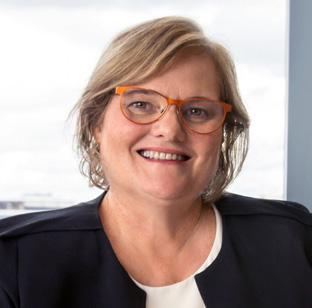
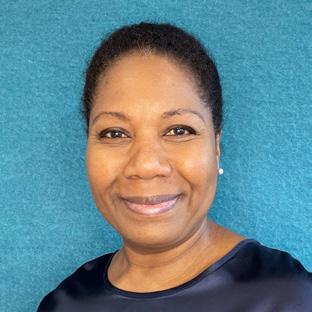





Pat McCafferty is the Managing Director of Yarra Valley Water, one of Australia’s largest water utilities with over 30 years of experience in the Water Sector including advising the Federal Government as part of the National Water Initiative and working in the USA water sector. He is also Chair of the Thriving Communities Partnership and past Chair of the Water Services Association of Australia. Pat is a member of the Leadership Oversight Committee for the Victorian Government’s Women in Water program and is a member of the Committee for Melbourne’s Sustainability and Infrastructure Committee. He is a signatory to the UN Global Compact and a passionate advocate of the Sustainable Development Goals. Attended: 2/3
Rob Skinner, prior Chair, is a Professorial Fellow at the Monash Sustainable Development Institute, Monash University, Melbourne. Rob has extensive experience in organisational leadership, including six years as Managing Director of Melbourne Water and ten years as CEO of Kingston Council in Victoria. Rob is also Director of Monash Water Sensitive Cities; Deputy chair of the CRC for Water sensitive Cities; Deputy Chair of Yarra Valley Water and Director of the International Centre of Excellence for Water Resources Management (ICEWARM). Attended: 1/1
Kevin Young, prior Deputy Chair, has over 20 years’ experience as a Director and over 40 years’ experience working for the private sector and government authorities within Australia and overseas. Kevin served as Managing Director of Sydney Water from 2011 to 2019, after serving as Hunter Water’s Managing Director. He has served as Chairman of the Water Services Association of Australia (WSAA). Kevin is a Fellow of the Institute of Engineers Australia and a Fellow of the Australian Institute of Company Directors. He is currently a Director of TasWater and CityCare New Zealand. Attended: 1/1





Francois Gouws, prior Director, is managing director of the TRILITY group of companies (34 companies) which operate across Australia and New Zealand. He has over 20 years’ international experience in the water industry and is Chair of the Infrastructure Partnerships Australia (IPA) Water Taskforce. Francois is also a former director and president of the Australian Water Association which is the peak body representing the Australian water industry. Attended: 1/1

35
Summary financial report
WaterAid’s full financial statements are available at: www.wateraid.org/au
These summary financial reports have been prepared in accordance with the requirements set out in the ACFID Code of Conduct. For further information on the Code please refer to the ACFID Code of Conduct
Implementation Guidance available at: www.acfid.asn.au
Income statement for the year ended 31 March 2022
During the year, WaterAid Australia had no transactions in the following categories: political or religious adherence promotion programs, international political or religious proselysation programs expenditure or domestic programs. Also, WaterAid Australia does not bring to account any nonmonetary revenue or expenditure.
36 | WaterAid Annual Report 2021/22
EXPENDITURE International aid and development programs expenditure International programs Funds to international programs 8.992 8.056 Program support costs 2.335 1.892 Community education 204 173 Fundraising costs Public 3.120 2.013 Government, multilateral and private -Accounting and administration 1.397 1.441 Total international aid and development programs expenditure 16.048 13.575 TOTAL EXPENDITURE 16.048 13.575 EXCESS/(SHORTFALL) OF REVENUE OVER EXPENDITURE -295 3.666 Other comprehensive income -41Total comprehensive income for the year -336 3.666
REVENUE 2022 2021 $’000 $’000 Donations and gifts Monetary 6.629 8.720 Non-monetary -Bequests and legacies 28 23 Grants Department of Foreign Affairs and Trade (DFAT) 6.280 5.804 WaterAid UK 318 95 WaterAid other members 2.083 1.610 Other Australian grants 121Other overseas grants 163 232 Investment income 9 13 Other income- Government Subsidies (JobKeeper) - 617 Other income- Government Subsidies (Cash Flow Boost) - 100 Other income 122 28 TOTAL REVENUE 15.753 17.241
Statement of financial position as at 31 March 2022
Statement of changes in equity
Directors' declaration
The Directors of the Group declare that:
The Directors of the Group declare that:
Directors' declaration
The Directors of the Group declare that:
1. The consolidated financial statements and notes of WaterAid Australia are in accordance with the Australian Council for International Development Charities and Not-for-profit Commission Act 2012, including:
1. The consolidated financial statements and notes of WaterAid Australia Ltd for the year ended 31 March 2022 are in accordance with the Australian Council for International Development Code of Conduct and the Australian Charities and Not-for-profit Commission Act 2012, including:
a. complying with Australian Accounting Standards, the Australian Code of Conduct and the Australian Charities and Not-for-profit Commission
1. The consolidated financial statements and notes of WaterAid Australia Ltd for the year ended 31 March 2022 are in accordance with the Australian Council for International Development Code of Conduct and the Australian Charities and Not-for-profit Commission Act 2012, including:


b. giving a true and fair view of the financial position as at 31 March financial year ended on that date;
a. complying with Australian Accounting Standards, the Australian Council for International Development Code of Conduct and the Australian Charities and Not-for-profit Commission Regulations; and
a. complying with Australian Accounting Standards, the Australian Council for International Development Code of Conduct and the Australian Charities and Not-for-profit Commission Regulations; and
2. In the Directors' opinion, there are reasonable grounds to believe that as and when they become due and payable.
b. giving a true and fair view of the financial position as at 31 March 2022 and of its performance for the financial year ended on that date;
b. giving a true and fair view of the financial position as at 31 March 2022 and of its performance for the financial year ended on that date;
This declaration is made in accordance with a resolution of the Board of Directors.
2. In the Directors' opinion, there are reasonable grounds to believe that the company will be able to pay its debts as and when they become due and payable.
2. In the Directors’ opinion, there are reasonable grounds to believe that the company will be able to pay its debts as and when they become due and payable.
This declaration is made in accordance with a resolution of the Board of Directors.
Director ................................................................................................................................................
This declaration is made in accordance with a resolution of the Board of Directors.

 Hon. Karlene Maywald, Chair
Hon. Karlene Maywald, Chair
Director ................................................................................................................................................
Hon. Karlene Maywald, Chair
Dated 7 of July 2022
Director ................................................................................................................................................
Louise Dudley
Dated 7 of July 2022
Dated 7 of July 2022
Director ................................................................................................................................................
Louise Dudley
Dated 7 of July 2022
ASSETS 2022 2021 Current assets $‘000 $‘000 Cash and cash equivalents 6.137 6.924 Trade and other receivables 2.714 475 Other financial assets 2.500 2.077 Contract Assets 392 519 Other assets 688 76 Total current assets 12.431 10.070 Non-current assets Right-of-use assets 302 379 Property, plant and equipment 253 215 Intangible assets 18 26 Total non-current assets 573 620 TOTAL ASSETS 13.004 10.690 LIABILITIES 2022 2021 Current liabilities $‘000 $‘000 Trade and other payables 564 476 Lease Liabilities 144 225 Provisions 577 532 Other financial liabilities 5.520 2.939 Total current liabilities 6.805 4.172 Non-current liabilities Lease Liabilities 185 166 Provisions 55 57 Total non-current liabilities 240 223 TOTAL LIABILITIES 7.045 4.395 NET ASSETS 5.959 6.295 EQUITY Retained earnings 6.000 6.295 Reserves - 41TOTAL EQUITY 5.959 6.295 2022 Retained earnings ($‘000) Foreign Currency Translation Reserve ($‘000) Total ($‘000) Balance at 1 April 2021 6.295 0 6.295 Excess/(Shortfall) of revenue over expenses (295) 0 (295) Adjustment from translation of foreign controlled entities 0 (41) (41) Balance at 31 March 2022 6.000 (41) 5.959 37 2021 Retained earnings ($‘000) Foreign Currency Translation Reserve ($‘000) Total ($‘000) Balance at 1 April 2020 2.629 0 2.629 Excess/(Shortfall) of revenue over expenses 3.666 0 3.666 Balance at 31 March 2021 6.295 0 6.295 Directors’
declaration
Independent Auditors Report
WaterAid Australia Ltd and Controlled Entities



ABN 99 700 687 141
Report of the Independent Auditor on the Summary Financial Statements

Opinion
The summary financial statements, which comprise the summary statement of financial position as at 31 March 2022, the summary statement of profit and loss and other comprehensive income and a summary statement of changes in equity for the year then ended, are derived from the audited financial report of WaterAid Australia Ltd and Controlled Entities for the year ended 31 March 2022.
In our opinion, the accompanying summary financial statements are consistent, in all material respects, with the audited financial report.
Summary Financial Statements

The summary financial statements do not contain all the disclosures required by Australian Accounting Standards – General Purpose Financial Statements - Reduced Disclosure Requirements, the Australian Charities and Not-for-profits Commission Act 2012 and the ACFID Code of Conduct Reading the summary financial statements and the auditor’s report thereon, therefore, is not a substitute for reading the audited financial report and the auditor’s report thereon. The summary financial statements and the audited financial report do not reflect the effects of events that occurred subsequent to the date of our report on the audited financial report
The Audited Financial Report and Our Report Thereon
We expressed an unmodified audit opinion on the audited financial report in our report dated 7 July 2022.
Board’s Responsibility for the Summary Financial Statements
The board is responsible for the preparation and presentation of the summary financial statements
Auditor’s Responsibility
Our responsibility is to express an opinion on whether the summary financial statements are consistent, in all material respects, with the audited financial report based on our procedures, which were conducted in accordance with Auditing Standard ASA 810 Engagements toReport on Summary Financial Statements
Saward Dawson
Partner: Jeffrey Tulk
Chartered Accountant
Date: 7 July 2022
Blackburn, Victoria 3130
38 | WaterAid Annual Report 2021/22
WaterAid Australia places accountability at the forefront of our work and upholds the highest standard of practice. We are an active member of the Australian Council for International Development (ACFID), making us a signatory to their Code of Conduct, which prescribes the highest standards of development practice. Information about how to make a complaint on breach of conduct can be found at: www.acfid.asn.au
WaterAid Australia is fully accredited by the Australian Government’s Department of Foreign Affairs and Trade. This status represents the Australian Government’s confidence in our organisational effectiveness, governance and development programs. We are an active member of the Australian Charities and Not-for-profits Commission and the Public Fundraising Regulatory Association. We are also committed to the Fundraising Institute of Australia’s Principles and Standards of Fundraising Practice.


We adhere to the ASX Corporate Governance Principles and Recommendations and ISO31000 Risk Management Practice, and we undergo both internal audits by WaterAid International and an annual external audit.

People in local communities are at the centre of our work and WaterAid Australia has an organisational Code of Conduct, Ethical Guidelines and a strong commitment to child safeguarding to ensure the best interests of our local partners and community members are always our priority.

39 WaterAid/ Jerry Galea
WaterAid/ Agiu
A woman washes her hands beside her new toilet in Almo village, Manufahi, Timor-Leste
WaterAid Australia
3 Albert Coates Lane, Melbourne, VIC, 3000, Australia
Phone: 1300 858 022
info@wateraid.org.au wateraid.org.au
ABN: 99 700 687 141
Stay in touch
To sign up for our regular e-newsletters, head to wateraid.org.au/subscribe

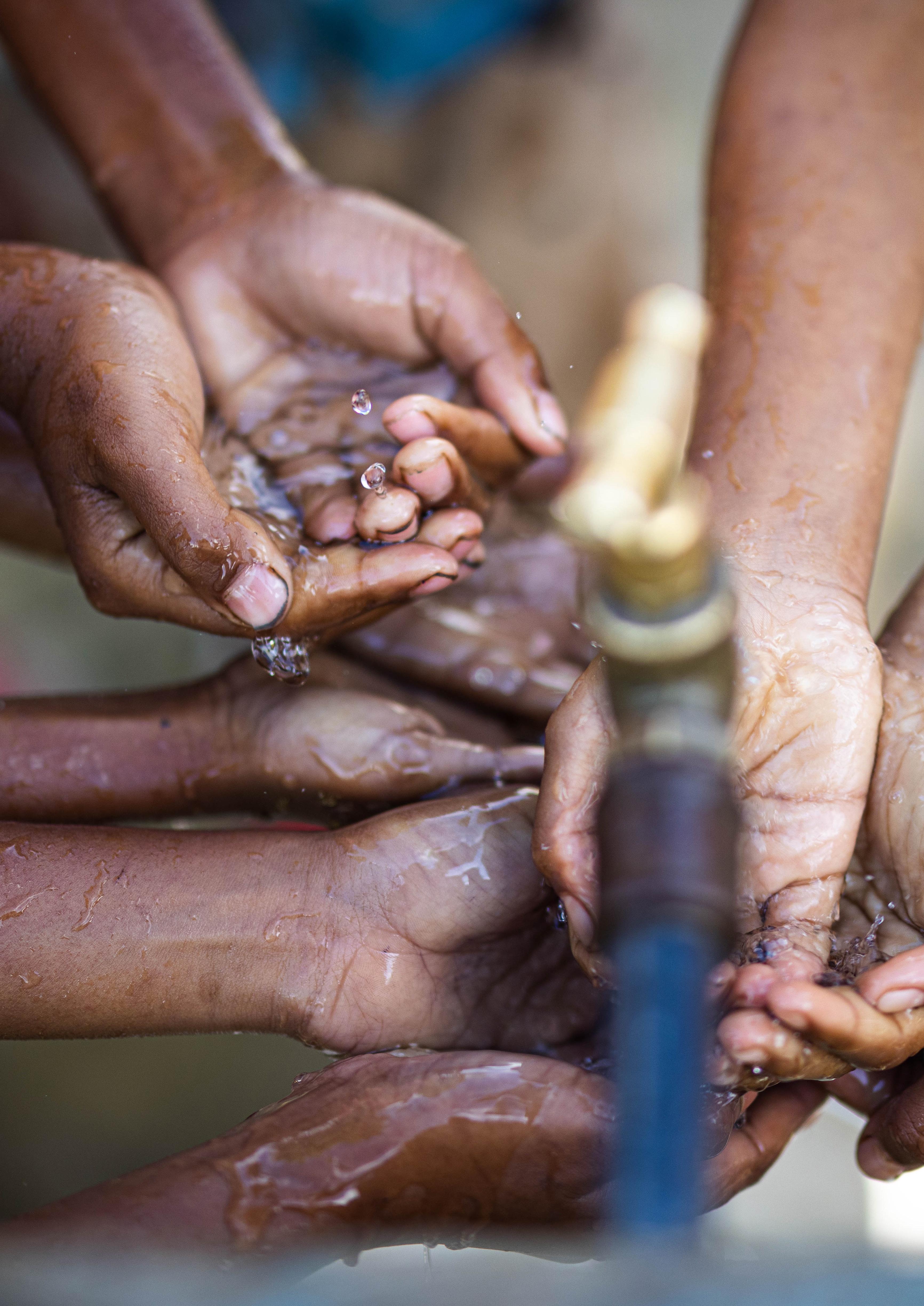
WaterAidAustralia
WaterAidAustralia
WaterAidAus
WaterAidAustralia /company/wateraidaustralia
WaterAid/Tariq Hawari

































































































































































